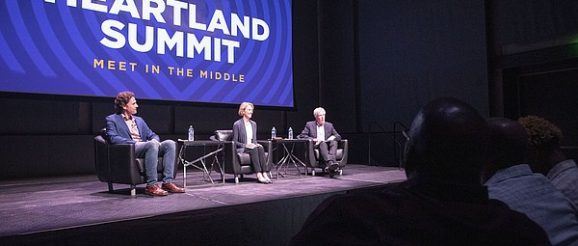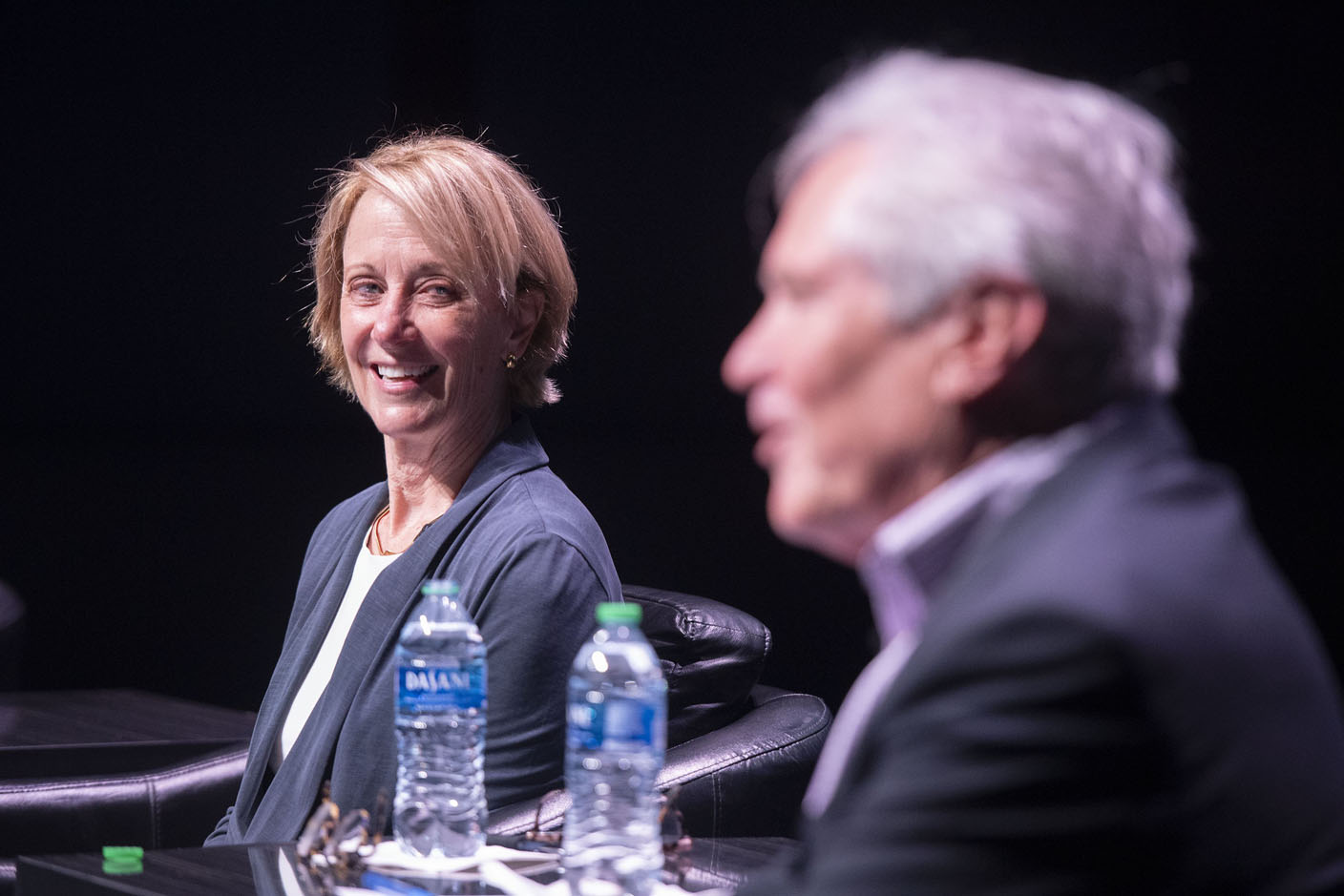Highlighting the Heartland: “Our Towns” discussion emphasizes small town innovation

BENTONVILLE — Though national attention tends to be focused on the coasts and major metropolitan areas of the United States, some of the most important stories are playing out in America’s small towns, an audience heard Wednesday at the Heartland Summit.
The two-day conference by nonprofit “think and do tank” Heartland Forward aims to change the narrative about the middle of the country and kick-start economic growth in the Heartland region, according to Angie Cooper, chief program officer of Heartland Forward.
It kicked off one of its first events Wednesday afternoon at the Momentary: a panel discussion accompanied by clips from the HBO documentary “Our Towns.”
“We’re strong believers that the middle of the country needs the coast just as much as the coast needs the middle of the country,” Cooper said. “There’s a lot of people that maybe have never traveled to the middle of the country. They don’t know those hidden gems — small-town South Dakota, small-town Texas, small-town Wisconsin — so these are the types of things we’re trying to share.”
Journalists James and Deborah Fallows, who appear in the film and co-wrote the book the movie was based upon, shared lessons learned from five years traveling the United States and listening to stories from people about how their communities were finding solutions to the challenges they faced.
Innovation and resilience in small-town communities deserve more news coverage than they receive, James Fallows said.
“People in my business — journalism, national journalism — systematically make a terrible error when interviewing people generally outside Washington, D.C., or New York or Los Angeles, which is flattening the complexity of American life to who you’re going to vote for in the presidential election,” he said. “When you ask people about their towns, their lives, their families, their businesses, people are smart and people are interesting and people are complex.”
The couple was joined on-stage by Michael Zakaras, director of Ashoka U.S., an organization that connects entrepreneurs working for social change across the country.
“One of the surprises of this journey was we were going around in our own country and we had no idea what to expect. It was a blank slate. How many times at the end of the day we would say the same thing of ‘You’ll never believe what I learned today,'” Deborah Fallows said.
By the end of the journey, similar versions of the same stories had emerged in different towns, showing trends, she said.
The growth brought by immigrant populations, the challenges of attracting youth and talent and the importance of local school and colleges were among the trends the couple explained during the discussion.
IMMIGRATION AND RACE
“There are a lot of parts of the country, especially in former industrial strongholds in the Midwest, where openness to refugees and immigrants, but refugees in particular, has been an intentional growth strategy,” James Fallows said.
Sioux Falls, S.D., and Erie, Pa., are examples of cities that have drawn large refugee populations, Fallows said.
Concerning racial differences, he said he was encouraged by efforts in places like Pensacola, Fla., to acknowledge historical failures in the community and work towards a reconciliation process.
“My hypothesis is that when it comes to the racial and religious issues … there’s more of this reckoning going on in more constructive ways city by city than there is nationally,” he said.
Students in the Sioux Falls school system speak 60 languages, Deborah Fallows said.
She said they were impressed by the ways different towns like Burlington, Vt., and Dodge City, Kan., accepted refugee and migrant populations.
YOUTH AND TALENT
“One of my unified field theories of American life is that you can count on maybe one hand the number of places in the U.S. that don’t feel looked down on by the rest of the country,” James Fallows said. “To varying degrees, the rest of Americans feel that they have something to show.”
Deborah Fallows said that many of the small towns were concerned about how to attract young people.
Listening and giving young people agency to enter into planning processes for the community were central factors for many communities.
“Instilling a sense of pride is one thing, but opportunity is another,” she said.
She said that the city of Eastport, Maine, decided to start a scholarship for local kids interested in the health care industry.
In farm town Winters, Calif., teachers have deliberately engaged kids in agricultural education to draw them in to the area’s primary industry, she said.
Local schools and community colleges also played a key role in towns like Columbus, Miss., Deborah said.
When major industries built factories nearby, East Mississippi Community College began teaching courses on the technical skills required to get well-paying jobs at the factories, she said.
In Greenville, S.C., young workers at local Michelin, BMW and General Electric plants would visit schools to teach technical skills needed to find jobs at those plants.
James said he was struck by the innovation and experimentation of many schools attempting to address the economic challenges of their residents.
“Pooling our ideas around the country, there’s no automatic application from one place to another, but we can all inspire each other,” he said.
 Deborah Fallows, writer and co-founder of Our Towns Civic Foundation smiles at James Fallows, contributing writer at the Atlantic, former speechwriter for President Jimmy Carter, and co-founder of Our Towns Civic Foundation during a panel discussion Wednesday May 11, 2022 at the Heartland Summit in Bentonville. The discussion covered topics related to the civic and economic reinvention of small towns across the United States. Visit nwaonline.com/220512Daily/ for daily galleries. (NWA Democrat-Gazette/J.T. Wampler)
Deborah Fallows, writer and co-founder of Our Towns Civic Foundation smiles at James Fallows, contributing writer at the Atlantic, former speechwriter for President Jimmy Carter, and co-founder of Our Towns Civic Foundation during a panel discussion Wednesday May 11, 2022 at the Heartland Summit in Bentonville. The discussion covered topics related to the civic and economic reinvention of small towns across the United States. Visit nwaonline.com/220512Daily/ for daily galleries. (NWA Democrat-Gazette/J.T. Wampler)